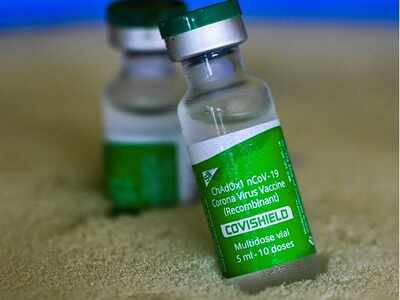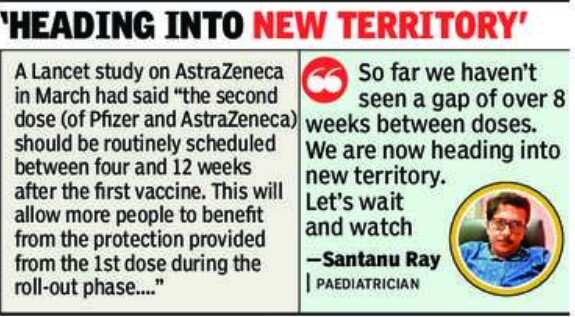Top Searches
- News
- City News
- kolkata News
- Covishield gap of over 12 weeks may be stretching it too far, say experts
Covishield gap of over 12 weeks may be stretching it too far, say experts

For Covishield, the gap was later extended to six-eight weeks and now, to 12-16 weeks. The government panel, however, made no recommendation to extend the gap for Covaxin.
KOLKATA: Experts in Kolkata felt it would be stretching the gap too far if the break between the first and second doses of Covishield, was extended to 12 -16 weeks. The gap was recommended by a central panel on Thursday following some recent research findings.
While a wait of up to three months (12 weeks) seemed plausible, going by findings in the run-up to the pandemic, some pointed out there was yet no concrete evidence to show either Covishield or Covaxin worked better when their twin doses were split by 12 weeks or more. Both Covishield and Covaxin had been recommended to be taken at a gap of four-six weeks at the start of the inoculation. For Covishield, the gap was later extended to six-eight weeks and now, to 12-16 weeks. The government panel, however, made no recommendation to extend the gap for Covaxin.

A Lancet study on AstraZeneca in March had said “that the second dose of both vaccines (Pfizer and AstraZeneca) should be routinely scheduled between four and 12 weeks after the first vaccine. This will allow more people to benefit from the protection provided from the first dose during the roll-out phase…”.
Serum Institute of India CEO Adar Poonawalla recently observed that the AstraZeneca-Oxford vaccine was 90% effective when applied at a gap of two-three months. Covishield is the Indian brand of the vaccine manufactured by Serum Institute under licence from AstraZeneca-Oxford. Poonawalla’s observation came at a time when millions across the country, including Bengal, waited for their second jabs.
Some, like IPGMER professor Diptendra Sarkar, are sceptical about the protracted gap. The last Lancet study in March showed an increase in vaccine efficacy after two standard doses from 55.1% with an interval of less than 6 weeks to 81.3% with an interval of at least 12 weeks, Sarkar said.
Spacing out vaccine doses allowed antibodies to form and act better, according to Peerless Hospital microbiologist Bhaskar Narayan Choudhuri. But, he, too, felt a gap of more than 12 weeks could be a little “too prolonged”. “The virus has started mutating and we are encountering several strains, including an Indian one. At this stage, a longer gap could be unwise.A third vaccine is on the anvil,” said Chaudhuri. He added studies of reports conducted at Peerless Hospital showed better results for one of the vaccines being administered. “We haven’t come across a single case of infection among people who received this vaccine where there have been several patients who have got Covid even after the second dose of the other vaccine,” said Chaudhuri.
But some, like Fortis Hospital internal medicine consultant Joydeep Ghosh, felt delaying the second dose would be a win-win situation for recipients. Efficacy of the second shot was not affected by a few weeks’ delay, he said.
“In fact, better antibodies are produced that offer stronger immunity. Also, it will help ease out the crisis generated by the shortage of vaccines. Waiting a week to 10 days extra will help. But I won’t recommend a 16-week gap yet,” said Ghosh.
What happens to those who got the shot earlier? Some experts felt it might make the antibodies lose potency earlier. The idea was to provide protection during the height of the pandemic, they said.
While a wait of up to three months (12 weeks) seemed plausible, going by findings in the run-up to the pandemic, some pointed out there was yet no concrete evidence to show either Covishield or Covaxin worked better when their twin doses were split by 12 weeks or more. Both Covishield and Covaxin had been recommended to be taken at a gap of four-six weeks at the start of the inoculation. For Covishield, the gap was later extended to six-eight weeks and now, to 12-16 weeks. The government panel, however, made no recommendation to extend the gap for Covaxin.

A Lancet study on AstraZeneca in March had said “that the second dose of both vaccines (Pfizer and AstraZeneca) should be routinely scheduled between four and 12 weeks after the first vaccine. This will allow more people to benefit from the protection provided from the first dose during the roll-out phase…”.
Serum Institute of India CEO Adar Poonawalla recently observed that the AstraZeneca-Oxford vaccine was 90% effective when applied at a gap of two-three months. Covishield is the Indian brand of the vaccine manufactured by Serum Institute under licence from AstraZeneca-Oxford. Poonawalla’s observation came at a time when millions across the country, including Bengal, waited for their second jabs.
Some, like IPGMER professor Diptendra Sarkar, are sceptical about the protracted gap. The last Lancet study in March showed an increase in vaccine efficacy after two standard doses from 55.1% with an interval of less than 6 weeks to 81.3% with an interval of at least 12 weeks, Sarkar said.
Spacing out vaccine doses allowed antibodies to form and act better, according to Peerless Hospital microbiologist Bhaskar Narayan Choudhuri. But, he, too, felt a gap of more than 12 weeks could be a little “too prolonged”. “The virus has started mutating and we are encountering several strains, including an Indian one. At this stage, a longer gap could be unwise.A third vaccine is on the anvil,” said Chaudhuri. He added studies of reports conducted at Peerless Hospital showed better results for one of the vaccines being administered. “We haven’t come across a single case of infection among people who received this vaccine where there have been several patients who have got Covid even after the second dose of the other vaccine,” said Chaudhuri.
But some, like Fortis Hospital internal medicine consultant Joydeep Ghosh, felt delaying the second dose would be a win-win situation for recipients. Efficacy of the second shot was not affected by a few weeks’ delay, he said.
“In fact, better antibodies are produced that offer stronger immunity. Also, it will help ease out the crisis generated by the shortage of vaccines. Waiting a week to 10 days extra will help. But I won’t recommend a 16-week gap yet,” said Ghosh.
What happens to those who got the shot earlier? Some experts felt it might make the antibodies lose potency earlier. The idea was to provide protection during the height of the pandemic, they said.
FacebookTwitterLinkedinEMail
end of article
Top Stories Right Now
- indiaIndia's Covid cases fall but deaths remain high; fatality rate rises in May
- indiaIndu Jain, Times Group chairman, attains nirvana
- indiaCovid live: India reports 3,43,122 fresh cases in the last 24 hours
- indiaRole model for women aspiring to be leaders in a man’s world
- indiaUP chief minister Yogi Adityanath visits AMU after several faculty deaths
